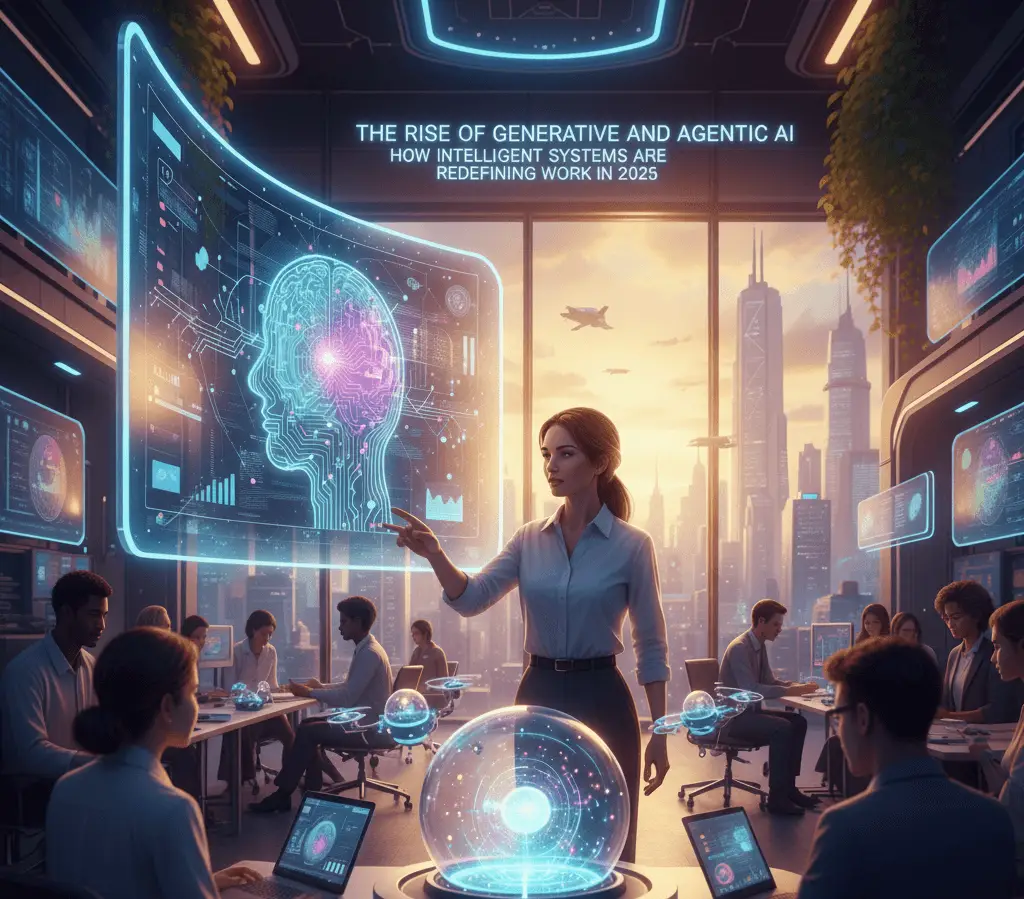Artificial intelligence has moved from novelty to necessity. In 2025, we no longer speak of AI as something futuristic. It is everywhere — writing code, editing videos, responding to customers, managing workflows, and even making business decisions. The shift is not just technological; it is structural. It changes how companies operate, how people work, and how entire industries evolve.
Agentic AI systems go beyond simple automation to plan, execute, and learn from their actions, enabling them to autonomously manage workflows like data analysis, IT monitoring, and customer service, which in turn allows human workers to focus on more creative and strategic efforts. This evolution is being driven by advancements in large language models (LLMs) and is already showing significant benefits in productivity, collaboration, and business agility.
Two main ideas define this shift: Generative AI and Agentic AI. The first creates; the second acts. Together, they form the backbone of what experts now call intelligent autonomy — systems that think, plan, and execute tasks once handled by humans.
This article explores how these systems are reshaping work, business, and opportunity — from Silicon Valley to Accra.
What Generative AI Really Means
Generative AI refers to models that can produce original content — text, images, music, or code — after learning from massive datasets. Tools like ChatGPT, Claude, Midjourney, and Runway are examples. But 2025 has taken this further.
Generative systems are now embedded within products and platforms:
Microsoft Copilot rewrites emails and automates Excel formulas.
Canva’s AI design engine drafts entire brand kits.
Adobe Firefly generates studio-grade images in seconds.
The purpose is not only speed but creativity at scale. Instead of relying solely on human design or writing, companies use AI to produce content faster and cheaper — while workers focus on refinement, strategy, and emotion-based storytelling.
For African creators, especially in media and marketing, this democratization is significant. A single designer in Ghana can now compete globally using the same creative tools as agencies in New York or London.
What Makes Agentic AI Different
While generative systems produce, Agentic AI performs. These are intelligent agents capable of reasoning, planning, and executing tasks autonomously.
An AI agent can:
Research a topic, summarize findings, and publish an article.
Read emails, schedule meetings, and follow up automatically.
Analyze website data and adjust SEO strategy without direct input.
In short, an agent is not reactive; it is proactive. It works continuously in the background, managing objectives rather than responding to single commands.
This is the foundation of autonomous digital work. For businesses, it promises efficiency. For employees, it raises new questions about skill, trust, and oversight.
From Tools to Teammates
In earlier years, AI was seen as an assistant — a tool to speed up human effort. In 2025, it has become a collaborator.
Companies now speak of “human-AI teams.” A human sets the goal, while an AI agent handles the operational path. The model writes, edits, or analyzes data, then requests feedback. Humans guide the system, not the task.
This new relationship defines a subtle balance:
Humans lead with intent.
AI follows with execution.
For example, a marketing manager might tell an agent:
“Generate three email campaigns for new subscribers. Analyze which performs best and schedule it for next Monday.”
The AI does all three — drafting, testing, scheduling — and returns data for review.
Such workflows are becoming standard across industries: journalism, logistics, healthcare, and retail. The goal is not full replacement but intelligent coordination.
Economic Implications and Job Evolution
With each wave of technology, work evolves. Generative and agentic AI are no different.
They automate repetitive tasks, but they also create new roles:
Prompt engineers and AI content editors refine model outputs.
Automation strategists design human-AI workflows.
Ethical auditors evaluate fairness and bias in AI decision-making.
In Ghana and across Africa, digital workers are already finding new niches. Freelancers who once wrote blog posts manually now use AI to produce drafts faster and focus on editing and originality. Customer service centers are shifting toward hybrid models — AI handles initial responses, humans take over when emotion or negotiation is required.
Rather than eliminating jobs outright, AI is shifting skill demand toward creativity, analysis, and system design.
The Power Shift in Content and Knowledge
Generative AI also changes who controls information.
Before, large media companies owned the content economy. Today, a single blogger can produce daily articles on technology, finance, or health using AI support.
This democratization has blurred the line between professional journalism and independent publishing. While it raises concerns about misinformation, it also expands participation.
For Savanabit.com and other African tech sites, the opportunity lies in localized interpretation. Western platforms often overlook regional relevance. By applying AI to Ghanaian or African tech stories — startups, fintech, renewable energy, policy shifts — smaller publishers can dominate regional search results and attract both local and international traffic.
AI gives smaller voices the tools to scale without losing authenticity.
The Business Impact: From Operations to Innovation
Corporations now build entire strategies around AI. McKinsey predicts AI will contribute more than $15 trillion to global GDP by 2030. The majority of this value will come from automation, data insights, and personalized services.
In practice:
Finance: AI agents analyze risk and detect fraud.
Healthcare: Generative systems create patient summaries and predict outcomes.
Education: Platforms adapt lessons to each learner.
Energy: AI monitors efficiency and predicts maintenance needs.
For startups in Ghana, especially in renewable energy or logistics, this presents a clear path to innovation. By integrating small AI functions — data tracking, reporting, predictive analytics — local businesses can match international standards faster and more affordably.
AI bridges the gap between resource-rich and resource-limited markets.
Ethical and Regulatory Considerations
As AI systems gain autonomy, regulation becomes crucial. The European Union has already introduced the AI Act, and other regions are following.
The main concerns are transparency, accountability, and data privacy. Who is responsible when an AI makes a mistake? How do we prevent bias from being encoded into automated decisions?
For African countries, regulation remains in early stages, but conversations are growing. Ghana’s Ministry of Communications has begun exploring ethical AI frameworks, recognizing that uncontrolled automation could lead to exploitation or misinformation.
Balancing innovation with protection is now the defining policy challenge of the decade.
Preparing for the Next Wave
For individuals and entrepreneurs, the question is no longer whether AI will impact work, but how to stay relevant.
Practical steps include:
Learning to write effective prompts for AI tools.
Understanding how agentic systems interact with APIs and workflows.
Building digital literacy around automation ethics.
Creating content that combines AI speed with human insight.
Businesses that adapt early will lead their markets. Those that ignore the shift risk becoming dependent on foreign solutions that may not understand local realities.
What It Means for Ghana and Africa
Africa has a unique position. It skipped several stages of industrial evolution and jumped directly into mobile technology. AI could create a similar leap.
With a young population, growing internet access, and a rising startup ecosystem, the continent can use AI to fill skill gaps, accelerate innovation, and attract foreign investment.
In Ghana, AI integration is already visible in:
Fintech (mobile money fraud detection, customer chatbots)
Agriculture (yield prediction, climate mapping)
E-commerce (inventory forecasting and customer experience)
Media (automated transcription, voice-over generation)
By combining local creativity with global tools, Africa can define its own digital future rather than adopting one built elsewhere.
The Human Element: Why Empathy Still Wins
No matter how advanced AI becomes, it cannot replicate emotional intelligence. Trust, ethics, and empathy remain human strengths.
Successful creators and companies will be those who blend AI’s precision with humanity’s depth. A system can write a sentence, but only a person can mean it.
As the world races toward automation, authenticity will become the rarest and most valuable resource.
Conclusion
Generative and Agentic AI mark the next phase of technological maturity. They redefine what machines can do and what humans should do.
The goal is not to fear automation but to understand it — to guide it toward productivity, equity, and creativity.
For every student learning prompt design, every blogger building an audience, and every startup optimizing its operations, AI is no longer optional. It is the new infrastructure of innovation.
Those who learn to collaborate with intelligent systems today will lead the digital economy of tomorrow.
#Generative AI, #AI agents, #AI automation in Africa, #future of work 2025, #AI tools Ghana, #AI trends, #Savanabit Tech







